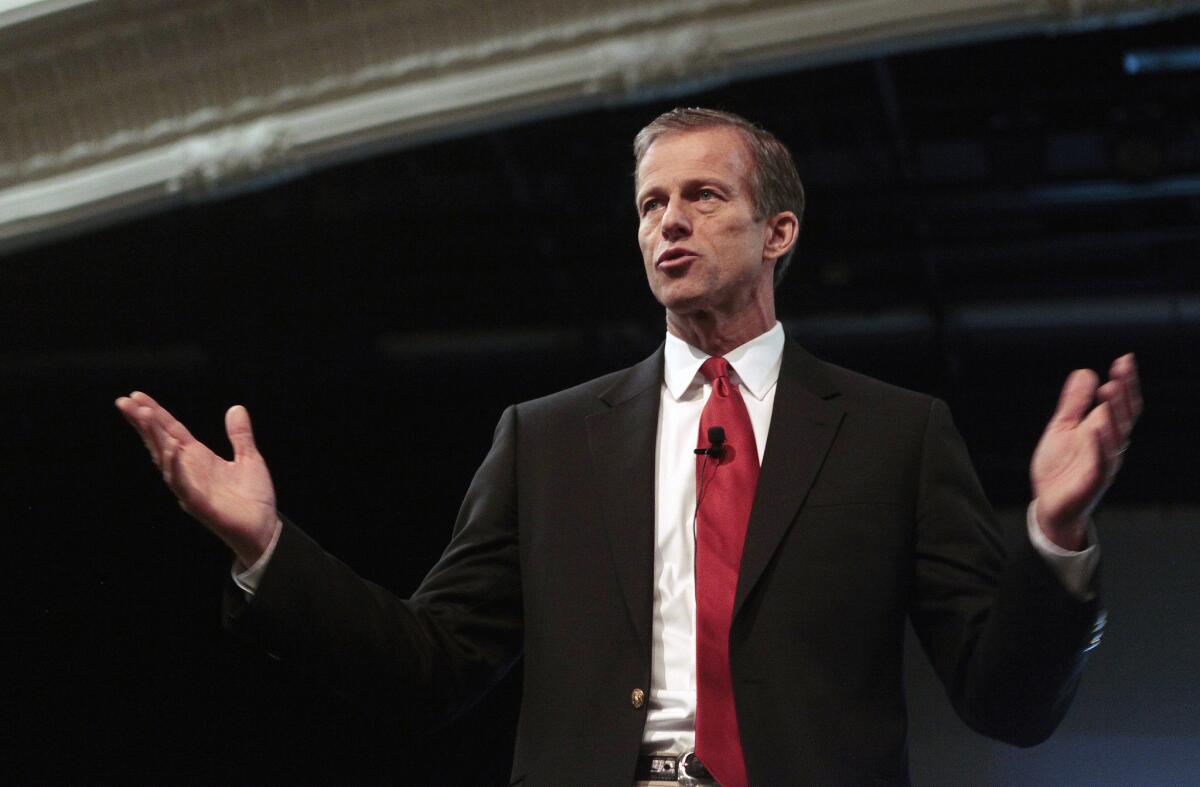Opinion: Republicans’ net neutrality bill hints at a middle ground

- Share via
The debate over the net neutrality rules proposed last year by Federal Communications Commission Chairman Tom Wheeler has made at least two things clear. First, there is broad support for rules that have the same goals as the ones the commission adopted in 2010, which an appeals court threw out last year. And second, there’s little agreement on how the commission might adopt effective rules without running afoul of the courts again.
So you might think that net neutrality advocates would jump for joy when the Republican chairmen of the relevant House and Senate committees floated a bill Friday to tackle the latter problem. The proposal by Senate Commerce Committee Chairman John Thune (R-S.D.) and House Energy and Commerce Committee Chairman Fred Upton (R-Mich.), would explicitly bar Internet service providers from blocking or throttling lawful content, services, apps or devices, and from creating fast and slow lanes on their networks in exchange for fees -- everything that President Obama and Wheeler have said they want to prohibit.
If only.
Thune and Upton being Republicans, their bill would actually leave the FCC with less authority than it has today. The agency would have the explicit power to act on complaints brought against ISPs that may have violated the new neutrality requirements, but not to “expand the Internet openness obligations” that the bill would create.
Another potentially controversial point: the measure would allow prioritization for “specialized services,” so long as it didn’t harm the ISP’s broadband offering, and for sites or services that the consumer asked to be prioritized. The latter allowance apparently would protect such things as limited wireless plans that provided access only to sites selected by the customer, or plans that exempted certain services from data caps.
The bill would also gut the provision of the 1996 Telecommunications Act that ordered the FCC and state telecom regulators to encourage the timely deployment of “advanced telecommunications capability” to all Americans. Thune and Upton proposed to eliminate any rulemaking and enforcement authority associated with that provision, which a federal appeals court has said could be used to impose net neutrality rules. Wheeler was also expected to use the provision to preempt state laws that discourage or bar local governments from building broadband networks.
Nevertheless, the discussion draft released by the lawmakers wasn’t meant to be the final version, or even necessarily the one they introduce. It was a trial balloon designed to gauge the reaction from net neutrality supporters as well as those who’ve questioned whether the neutrality rules are a solution in search of a problem.
One such skeptic, Berin Szoka of the libertarian advocacy group TechFreedom, gave the bill the thumbs up and challenged Obama to embrace it as a compromise.
“Democrats have insisted the FCC needs clear authority to require transparency, ban paid prioritization, and prohibit blocking or throttling of lawful content and services,” Szoka said in a statement. “The bill gives Democrats what they want while also allaying Republican concerns about the unintended consequences of regulation.
“Voice, video, gaming, telemedicine and other services need special treatment to work. This bill ensures that such services will work for users, if they choose them, while addressing hypothetical concerns that broadband providers might play favorites or squelch speech they don’t like.”
On the other side, Harold Feld of Public Knowledge, which is pressing for strict neutrality rules, called the bill a “good faith step forward” while still finding fault with seemingly every section of the text. According to Feld, the measure is so narrowly drawn that it would still allow ISPs to discriminate against some sites and services and to create fast lanes under the guise of specialized services. And while the bill would roll back the FCC’s authority to protect consumers, Feld complained, it would exempt ISPs from the neutrality rules when cracking down on online copyright infringers.
If there’s a compromise here, it will happen only because Republicans decide that their constituents really do want net neutrality rules. Given the agreement on the goals, there’s the potential for both sides to settle on a path that gives the FCC the authority to preserve the neutral status quo online without discouraging investment or denying ISPs any room to innovate. That could conceivably take the form of a bill that writes the FCC’s longstanding neutrality principles into law, while giving the commission the authority to update those principles as necessary to preserve their effectiveness.
But while Republicans helped kill PIPA and SOPA in response to grass-roots outrage, the GOP is far more comfortable blocking new laws and regulations than imposing them, as Thune and Upton have proposed. What’s worse, congressional Republicans have a long-festering dislike of the FCC.
If Wheeler moves ahead with a vote next month on neutrality rules, that won’t help his cause on Capitol Hill -- especially not if those rules would reclassify ISPs as utilities, a change most (but not all) of the large ISPs and their GOP allies have denounced. On the other hand, considering how split lawmakers have been on this issue, waiting for them to act may be self-defeating as well.
Follow Healey’s intermittent Twitter feed: @jcahealey
More to Read
A cure for the common opinion
Get thought-provoking perspectives with our weekly newsletter.
You may occasionally receive promotional content from the Los Angeles Times.










